Several members of the Harvard Law School faculty knew both Barack and Michelle Obama during their time as students, and have stayed in touch with them over the years. Here, some of them react to the election.
Professor Wilkins taught Michele Obama and also knew Barack Obama as a student – and has supported his political career ever since. Professor Wilkins has served on various committees during the campaign and co-hosted several fundraisers, as well as speaking for the campaign in Pennsylvania, Virginia, Illinois and Massachusetts.

“I believe that the 2008 election will be considered one of the most important in this nation’s history – less for what it says about America’s past than for what it portends for our future. To be sure, electing the first black president is an enormous accomplishment, one for which all Americans can justly be proud. As President Obama often says, his story could only happen here. But when the history of this election is finally written, that story line – as important as it is – will not be what is remembered most. Instead, I believe that people will look back on this election as the time when America first began to tap into the enormous potential of a new generation that came of age after the great awakenings of the civil rights movement and the other upheavals that remade America in the middle decades of the twentieth century. This is a generation that, as my colleague John Palfrey has perceptively written, was “born digital” – and, equally important, global as well. They have grown up in a shrinking (if not yet quite flat) world and they want to belong to it. They have witnessed increasing diversity (if not yet quite full equality) at all levels of society at home, and they want to take it for granted. They have seen the emergence of big ideas and causes like global warming and human rights (notwithstanding our too often small politics), and they want to try to tackle them. Candidate Obama tapped into this new generation’s hopes and dreams like no other politician before him in much the same way that John Kennedy reached the generation of Americans who came of age after World War II. And just like President Kennedy, I believe that Obama will unleash the energy of this new generation to create programs and policies that will have as lasting an impact as the Peace Corps, the Rights Revolution, and the other innovations created by those President Kennedy inspired that helped to transform America and the world. I can’t wait to see the transformations that this new generation inspired by President Obama will bring.”
Professor Mack ’91 was a close friend of Obama’s in law school as a classmate and fellow member of the Harvard Law Review editorial board. He has also spoke about Obama on Frontline’s documentary, “The Choice,” and published an op-ed entitled “Even at Harvard, Obama had a knack for bonding with diverse people” last February.
“Barack Obama’s victory, and its substantial margin, confirms his continuing redefinition of both racial perceptions and the contours of democratic participation. It began with his caucus victory in Iowa, a state that is 96 percent white and 3 percent foreign born, which upended the conventional wisdom about what a relatively young black candidate named Barack Obama could achieve. That victory was the product of his campaign’s extraordinary facility with small-d democratic organization, with much of the innovation coming from networks of volunteers who worked from the ground up.
“His primary campaign was strongest in states where organizing, rather than the mass media campaigns that have dominated recent politics, made the most difference. It also built on reforms that had been brewing within the Democratic party primary system since the late 1960s that made it far more possible than it had ever been before for an upstart challenger to take on an established party regular. That victory was also fueled by a fundraising apparatus that relied on webs of innovation that brought in a massive number of donors to participate in the political process, and will redefine campaign finance debates for the foreseeable future.
“All these factors carried him to a margin of victory in the general election that would have seemed unlikely only months before. He becomes the first Democratic presidential candidate in 32 years to win a majority of the popular vote, a fact made even more extraordinary by his racial identity. Not since the days of the old-style political party apparatus has a presidential campaign shown such facility in engaging its supporters in the political process and getting them to vote. His victory points the way toward what a 21st century political campaign will look like.”
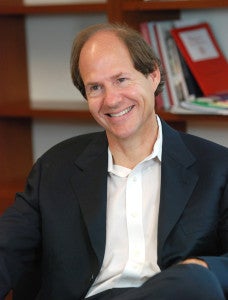
Cass Sunstein ’78 Professor Sunstein first met Obama when they both taught at the University of Chicago Law School. He has advised Obama on legal issues, and he volunteered to campaign on his behalf in Iowa prior to that state’s caucus.
“The central meaning is that the nation is ready for a new generation of leadership and someone who transcends standard liberal-conservative divides. It would signal an interest in both a change away from the polarizing politics of the last thirty years and a new roll up your sleeves attitude toward multiple problems. You might think of it as a new pragmatism, a new bipartisanship and an unquestionable generational shift away from the fights of the 1960s, away from some of the debates of the World War II generation, towards something less polarizing and less angry.”
Excerpted from the op-ed, “The Empiricist Strikes Back,” which was published in the New Republic on September 10, 2008:
“Of course Obama is a progressive. From health care to assistance for low-income families to education to environmental protection, he emphasizes that Americans have duties to one another, and that government should be taking active steps to provide equal opportunity and to help those who need help. But, by nature, he is also an independent thinker, and he listens to all sides. One of his most distinctive features is that he is a minimalist, not in the sense that he always favors small steps (he doesn’t), but because he prefers solutions that can be accepted by people with a wide variety of theoretical inclinations. When he offers visionary approaches, he does so as a visionary minimalist–that is, as someone who attempts to accommodate, rather than to repudiate, the defining beliefs of most Americans.”
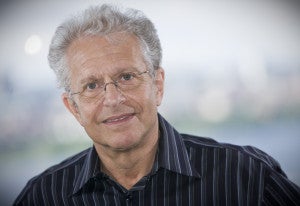
Laurence Tribe ’66
Professor Tribe hired Obama as a research assistant during his first year at Harvard Law School and taught him constitutional law. He has advised the Obama campaign on legal issues and campaigned on his behalf in Iowa and New Hampshire.
“Barack Obama’s historic victory is a transformational vindication of everything I’ve hoped would happen in America since I came here from Shanghai at the age of 5 and a half. His election is a breath of fresh air and the chance for a new start, as President-elect Obama grapples with problems more profound than any president since Franklin Roosevelt has had to confront.”
Excerpted from the op-ed, “Morning-After Pride,” which was published in the November 5, 2008 edition of Forbes Magazine.
Barack Obama’s unique ability to explain and to motivate, coupled with his signature ability to listen and to learn, and linked with the calm that marked his nearly flawless campaign, will serve him–and all of us–well as we grapple with as daunting a set of problems as the nation has faced in three-quarters of a century. It is of course true that only time will tell just how successful this brave, brilliant and caring man will be in charting a new course for the country, something that will depend only partly on decisions that Obama will make as president.
But one thing is already certain: The very fact of Barack Obama’s election at this defining moment–quite apart from the programs he pursues and the ways in which he pursues them–already speaks volumes to everyone on the planet. His election in and of itself displays how dramatically America has moved to transcend the divisions of its past and bids fair to give us a new lease on life in a world that had come, and not without reason, to see us in an awful light–a world that will now give this nation a fresh look and a second chance.
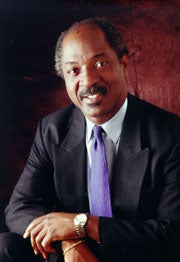
Charles Ogletree ’78
Professor Ogletree taught Michelle Obama ’88 in an advocacy workshop and later also got to know Barack Obama when he was a student.”
An Obama victory means an enormous amount of progress both nationally and globally. It will show that the country is ready for constructive change and is also ready to follow a leader who is very consultative and inclusionary. It will mean our respect globally will increase dramatically and that people will be drawn to public service just as they were when John F. Kennedy was elected in 1960 and Bill Clinton elected in 1992. People will see this as an opportunity to serve in government and make it a much more participatory pursuit than what we’ve seen in previous years. For me personally, it will be a wonderful sign to see these two young, brilliant law students two decades later taking on some of the biggest challenges our society can possibly present.”
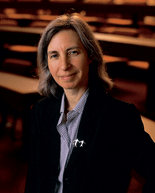
Martha Minow Professor Minow taught Barack Obama in a course on law and society at Harvard Law School and served with him on a national panel examining civic engagement when he served as a state senator. She served as an advisor to his campaign on legal issues and education policy.
“ Election of Senator Obama as President means a chance for a new start for our nation in terms of our global relationships. The level of support internationally for him in recent polls is 4:1 and in some parts of the world it is 8:1. Electing Obama as President would give us a chance to turn a new leaf after we’ve gone through this very sad period of losing our international reputation as a leader in human rights, military effectiveness, and economic success. I think he would pick up the lost thread of our commitment to the rule of law and human rights while renewing strong ties with countries all over the world. That’s highly relevant to our national security. If we elect him then we tell the world we have changed in our treatment of African-Americans and we start to redeem the promise of this nation as a place where anyone can make it. Secondly, electing Obama as President holds out the possibility of a kind of practical politics that moves beyond partisan division and stalemate. His approach to problems shows a kind of pragmatism; he doesn’t care who came up with the idea; he wants solutions that will bring people together and at the same time truly engage people in self-governance. He could unleash the greatest wealth in this country: the generosity and ingenuity of the American people. Domestically, he would reinstate respect for the rule of law, restore the integrity of government lawyers and ensure that we do not use the outsourcing of government work to bypass public obligations. A government official in another country wrote me words that put it well: ‘You can’t imagine, well actually you can, what an inspiration Obama is to democratic politics worldwide. He’s rewritten the book on how it has to be done. And he will make a great President. You are lucky to be living in the republic at these times.’”
Randall Kennedy
Professor Kennedy is a nationally recognized expert on race relations who is teaching a course this semester on the issue of race and the 2008 presidential campaign.
“It’s certainly a landmark moment for race relations. In class, I have often talked about two traditions. One is the pessimistic view that ‘we shall not overcome’ and then there’s the optimistic view that ‘we shall overcome.’ I put myself in the optimistic camp and this a great and hopeful moment. One of the major parties in the United States nominated a black man to be its standard bearer for president of the United States and the people elected him. But it does not mean, as some people want to assert, that race plays no role. Race still plays an important role but the fact that he’s gotten this far signals a tremendous change in American life. I’m not being a Pollyanna. I’m not closing my eyes to continue race problems the United States faces but I think we shouldn’t close our eyes to the real advance this represents.”
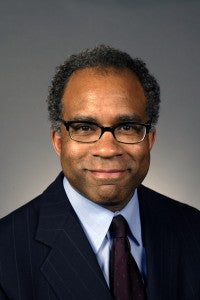
Bill Alford ’77 was a member of the Obama campaign’s foreign policy team, focused on issues concerning Asia and, in particular, China. His wife, Yuanyuan Shen LL.M. ’89, campaigned in New Hampshire in both the primary and general elections.
By 9 AM on Wednesday November 5, I had received phone calls or emails from friends on every continent (save Antarctica) congratulating the US (and Harvard Law School) on Senator Obama’s victory. As one eminent Canadian put it, “welcome back to the world, America—we’ve missed you.” Beyond revitalizing our historic relationships, I sense that the President-elect (with his experience living in humble circumstances in Indonesia while young and with his personal ties to Africa) carries an unprecedentedly deep understanding of the problems of development and global inequality that are so critical themselves and for the future of the international order. Also, at the risk of being parochial, I have to say that the election results underscore what is best about this Law School—that it provides opportunities for people of great talent, irrespective of their backgrounds, to realize their potential.
